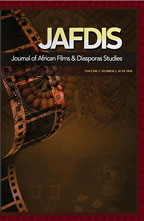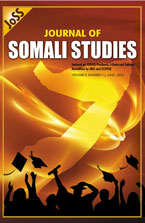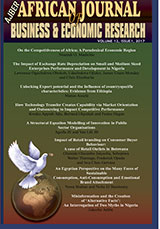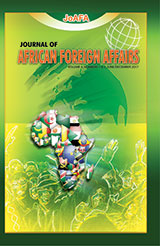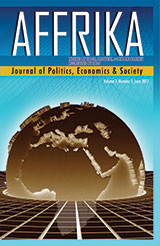
 editor@adonis-abbey.com
editor@adonis-abbey.com ![]() UK: 0207 795 8187 / Nigeria:+234 705 807 8841
UK: 0207 795 8187 / Nigeria:+234 705 807 8841

View Table of Content
African Journal of Information Science, Fine Arts and Speech Studies (AJISFASS) Volume 1, Number 1, June 2024
This is the first issue of the African Journal of Information Science, Fine Arts and Speech Studies (AJISFASS) which is a newly established journal that aims to cover research efforts on the production of knowledge in the fields of Information Science, Fine Arts and Speech Studies. This sought to establish the new integration of three different disciplines to create continuous multi-disciplines from these three different fields of study. This issue captures different views from different African continents on subjects of Information Science, Fine Arts and Speech Studies. Numerous manuscripts were submitted for consideration to be published in this special issue, but unfortunately, we could not accommodate all of them. Based on the double-blind peer review process and open peer review process the journal selected eight stand-out manuscripts for publication in this special issue. The first paper thoroughly explored legislative and policy frameworks for Indigenous knowledge in Kenya ...
View Table of Content
Journal of African Films, Diaspora Studies, Performance Arts and Communication Studies (JAFDIS) Volume 3, Number 2, December 2020
The Journal of African Films & Diaspora Studies (JAFDIS) recognizes the dynamism of society and the forces that drive social change. Some of the drivers of societal change and advancement from certain disciplines have not been given adequate recognition and attention. As a result, the contributions of researchers, academics, policymakers, and practitioners from those areas are under-reported and misreported. The greatest victims of this unhealthy practice appear to be those of Diaspora Studies, Performance and Communication, Arts as well as Films, especially, in the continent of Africa. This Journal was established specifically to address this challenge, and it has been consistent in promoting this cause since its inception. Practitioners, researchers, policymakers, and academics have leveraged the platform provided by this Journal to publish their research outputs, project their contributions and respective disciplines in an unbiased manner, as evident in the Is...
View Table of Content
African Journal of Business and Economic Research (AJBER) : Vol. 13, (Issue 2), August 2018
It is with great pleasure that I introduce this year’s second issue of African Journal of Business and Economic Research (AJBER). This issue features ten papers, covering six African countries; Ghana, Mauritius, Namibia, Nigeria, South Africa, Zimbabwe. The topics covered addresses the issues ranging from stock market efficiency to executive directors’ remuneration disclosure; the viability of emerging and frontier currency carry trades as an asset class in Africa; effectiveness of business management and entrepreneurship training offered by small and medium enterprise service providers; perceptions of various aspects of Broad-Based Black Economic Empowerment; gender gap in accessing formal credit for entrepreneurial purposes; organizational alignment; brand awareness and loyalty; government expenditure, economic growth and unemployment. While these studies are country specific, the focus of the studies and findings are applicable to other African countries. Let me take th...
View Table of Content
AFFRIKA Journal of Politics, Economics and Society Volume 7, Number 1, June 2017
The present Issue of Affrika: Journal of Politics, Economics and Society (JPES) attempts a somewhat panoramic look at the African continent by engaging with issues concerning various African countries. In specific terms, the Issue contains eleven scholarly contributions on seven different African countries namely Somalia, Kenya, Tanzania, Sudan, Zimbabwe, South Africa, and Nigeria. More remarkable is the fact that one of such articles foraged beyond Africa by beaming its searchlight towards the interplay of Africa and the United States of America. At the end of it all, the Issue comprises seven research articles, one opinion article or commentary, and three book reviews. The beauty of this lies in the representation of the three foci of the journal, namely politics, economics, and society, in this Issue. These indeed are among the factors demonstrating the uniqueness of the present Issue, as will be articulated below. In their article entitled “Terrorism in Africa: A...
View Table of Content
African Journal of Business and Economic Research (AJBER),Volume 8, Numbers 2&3
Sub-Saharan Africa has been on world headlines in recent months, more for devastating and heart-wrenching news than for any other. The news is sour from the South to North, West to East – and especially so in the largest economies such as South Africa and Nigeria, and other rising power houses such as Kenya. In the particular case of South Africa, December 6, 2013 marks a great loss as the world witnessed the departure of a global statesman who delivered his country from the dark days of apartheid, Nelson Rolihlahla (troublemaker) Mandela, South African anti-apartheid revolutionary who was imprisoned and then became a politician, philanthropist, and President of his country between 1994 to 1999, who died at the age of 95. As the current President Jacob Zuma put it (Laing, 2013) "Our nation has lost its greatest son." The implications of Mandela\'s death are far-reaching for a country that has been bedevilled with political uncertainty with...
View Table of Content
Critical Reflections on the OAU’s 50th Anniversary Commemoration and the AU Agenda Towards 2063
The year 2013 marks the 50th anniversary celebration of the formation of the Organization of African Unity (OAU). It will also be a little more than a decade since the formation of the African Union (AU), which seeks to promote “an integrated, prosperous and peaceful Africa, driven by its own citizens and representing a dynamic force in global arena”. Consequently, the Heads of State declared the year 2013 the Year of Pan-Africanism and the African Renaissance. The 21st Ordinary Session of the Summit of the AU also took place from 19-27th May 2013 under the theme “Pan Africanism and African Renaissance”. As declared by the AU, the anniversary is expected to facilitate and celebrate African narratives of past, present and future that will enthuse and energize the African population and use their constructive energy to accelerate a forward looking agenda of Pan-Africanism and renaissance in the 21st century. It provides a unique opportunity, and comes at a ...
To subscribe to any of the journals, Please Email Us.




